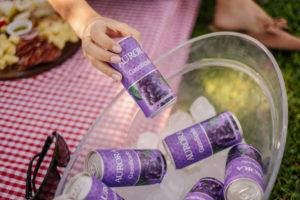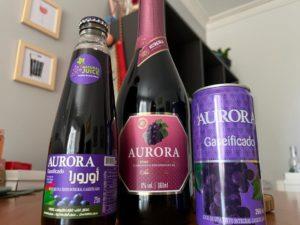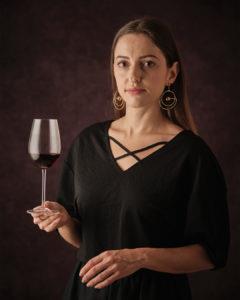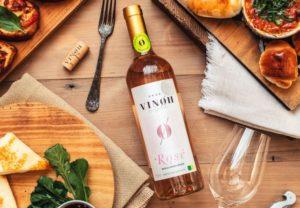(MENAFN- Brazil-Arab News Agency (ANBA))

São Paulo – Aurora, one of Brazil's largest wineries, is also one of the world's largest pure grape juice manufacturers. The company based in Rio Grande do Sul has invested in the segment of non-alcoholic beverages for export, a rising global trend, and besides grape juice, it also offers sparkling grape juice made from red and white grapes and sold in bottles of sparkling wine. The company is producing a version in a can, which is easier and more practical to export in containers.

Carbonated red grape juice: In cans and sparkling wine bottles and with metal lid
Aurora exports manager Giorgia Mezacasa told ANBA they sell sparkling grape juice to China and Libya , and it is in talks with Paraguay. She says the carbonated juice is additive-free and sugar-free and contains only the same preservative of the wine, enough for the product to travel safely.
“We've developed a good relationship with China, so much so that we have a representative there. We sell wines and pure grape juice, and in 2020 they asked Aurora to develop a sparkling grape juice,” Mezacasa said. The Brazil-based company started selling carbonated juice to China in large volumes in both white and red versions, in 660-ml sparkling wine bottles corked with natural corks.
Shipments to Libya are more recent.“We've sold pure juice to this country for many years, and we talked about his new product and sent a 660-ml bottle batch,” the manager said. The label goes in Arabic , but the name Aurora remains in Portuguese. Another option is a smaller glass bottle of 275 ml with a metal lid. The sparkling grape juice is sold in Brazil, too, only in the red version.
Mezacasa believes that exports bring the benefit of innovation to the company.“It's very good to be able to have this cultural exchange. In a wine trade show in China, I saw manufacturers from countries like Australia, Italy, Spain and France launching sparkling grape juices and non-alcoholic wines. Many countries are investing in these alcohol-free products, but the grape juice always have some type of addictive; ours is much better in quality,” she emphasized.

Mezacasa: New releases for export
According to Statista , a company specializing in market and consumer data, the consumption of non-alcoholic beverages is expected to sharply increase in the next few years. In 2021, 354.55 billion liters of soft drinks and 35.06 billion liters of juices were consumed across the world. For 2026, it is projected that the consumption of soft drinks reaches 385.135 billion liters of soft drinks and around 38 billion liters of juice in the global market.
The sparkling grape juice by Aurora contains the same preservatives that goes in the wine.“To get them across the world, we have to use some preservatives, but we're proud to have a very short list of ingredients,” she explained. The juices by Aurora are made from American grapes grown in Vale dos Vinhedos, Rio Grande do Sul.
The next step, Mezacasa says, is launching the sparkling juice in cans for the foreign market.“For now, we only sell the juice in 269-ml cans in Brazil. The can is very appealing and competitive overseas because you can fill a container. The amount for export is good; the glass bottle is well regarded, but cans provide a weight reduction, as well as withstanding higher temperatures,” she said.
Last year, Aurora sold 150,000 liters of carbonated and non-carbonated juice, amounting for 41% of its revenue. Exports climbed 88% in volume and 89% in revenue.
Mezacasa guarantees that the grape juice from Brazil is the world's best.“There is no grape juice in the United States, and other countries that manufacture it make it from concentrates. Only here we make totally pure, addictive-free grape juice,” she said.
She says she plans to export 40% of the juices produced by Aurora.“We want to take full advantage of this exclusivity, of our special product and our expertise, and now with the market evolution trends, we can manufacture sparkling juice, too.”
The Aurora's manager said she is considering obtaining the halal certification for the juice next year. The company plans to have sales representatives in the United Arab Emirates and Egypt to break into these markets and sell grape juice and wines. Non-alcoholic wines are not in the company's plans.
Vinoh
The firm Vinoh started manufacturing non-alcoholic wines last year. Sales started in October 2021. In the pandemic, managing partner Vlademir Grechi, who was the commercial agent in a winery, and his wife Luci Penso, oenologist and managing partner, decided to create a company with a non-traditional product.“It's enjoying plenty of success. Our idea was catering to people with medical conditions, and for now, we are focusing on the domestic market,” he told ANBA.

Vinoh manufactures non-alcoholic wines
The production last year reached 2,000 bottles. Vinoh is located in Bento Gonçalves, Rio Grande do Sul. The company buys finished wines from wineries in the region and carries out the dealcoholization process. For now, they sell the rosé (Moscatel and Merlot grapes) and red (Merlot) versions, but Grechi says that they are thinking on creating white and sparkling wines for the brand.
“If you offer it to someone that drinks wine often, they will notice the difference as the range of aromas and flavors change, but our job is maintaining most of the aromas,” he explains. According to the director, the non-alcoholic wine is a pleasant refreshing drink.“For those who don't drink alcohol, for whatever reason, and is at a party, this is an alternative for you to not feel left out,” he said.
Non-alcoholic wines by Vinoh have 0.5% of alcohol, the maximum allowed by Brazilian health agency Anvisa. As it is a company that is giving its first steps, the focus is still on the domestic market, but there is a desire to export eventually.
Halal wine
Some wine manufacturers in countries like Spain, France and Italy are investing in alcohol-free wines, with 0.0% of alcohol. The possibility of halal certification for these products, though, is controversial.
The Federation of Muslim Associations in Brazil (FAMBRAS) explains that the basic rule in Islamic law (Sharia) on foods and beverages is that all things are halal (fit for Muslim consumption) except for those specifically described in the Sharia as haram (forbidden) like alcoholic beverage.“Therefore, it's well described in the Quran that wine is a haram beverage due to the presence of alcohol in its composition, which causes an intoxicating effect,” FAMBRAS said.
In the case of non-alcoholic wine, there are different stances among Islamic religious authorities across the world, FAMBRAS said.
According to the Islamic law of Saudi Arabia's Permanent Committee, if a beverage consumed in either small or large volumes causes no inebriation, then it is allowed to sell it, buy it or drink it, the federation said.“If the wine is not intoxicating as the result of a physical or chemical dealcoholization method, and it is still possible to remove the characteristic odor and flavor of the wine, and if the smell and flavor of the wine are also eliminated, Islamic schools like Maliki and Hanafi sustain that this type of wine is allowed, according to the process of purification through alcohol distillation, whether naturally or through additives or treatment. This is the thesis approved by the Islamic Affairs and Charitable Activities Department of Dubai, as well as scholars from the Kingdom of Saudi Arabia,” FAMBRAS told ANBA.
On the other hand, the Shafi'i and Hanbali schools as well as Jordan's Iftaa Department don't accept non-alcoholic wine as a halal beverage as the alcohol distillation does not occur in a natural, autonomous manner like through the action of the sun, but through an intentional action.“We also saw that authorities in Egypt advise that a beverage should not be consumed if it reminds wine, that is, have traits like its color, odor or flavor, even if it doesn't contain alcohol, so that people don't mistake it with the real wine. The same goes for licit beverages like sparkling red juice if it's sold in wine bottles in order to avoid confusion,” they said.
FAMBRAS remains neutral in the topic of non-alcoholic wine.“There are those who allow it and those who forbid it across the world, and FAMBRAS would adapt to the market as required. But we at FAMBRAS don't make a stand to allow it or forbid it,” they said.
Translated by Guilherme Miranda
Supplied/Aurora
Supplied/Aurora
Supplied/Vinoh
The post Companies invest in non-alcoholic beverages for export appeared first on Agência de Notícias Brasil-Árabe .
MENAFN19042022000213011057ID1104052849